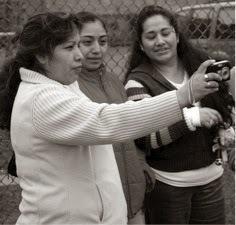Our Photovoice journey: An act of exhausting bravery
Our paper brings you more than just “lessons learned,” instead, we show you how fears are deeply embedded in the political statements that our photographs attempt to visualize. These fears, however, are interlaced by hope, conviction, strength and the belief that our voices, as U.S. Latinas, are needed to frame those political statements.
Initially, the North Portland HEAL Photovoice project hoped to use photographs to understand the everyday lives of Latino immigrant families in North Portland, however, we ran with the project and used photographs to bring forth our voices (which are either submerged or obscured by institutional practices that claim to speak for us). In short, we wanted to make a political statement about U.S. Latinas as creators of knowledge.
This article is not a manual. It is just one way that one can use participatory action approaches to truly and sincerely give voice to those in our communities. Our modification of the Photovoice methodology, which we dubbed as Mujerista Photovoice, is an invitation to challenge the way we do methods so we can make more visible the remaining work that needs to be done.

